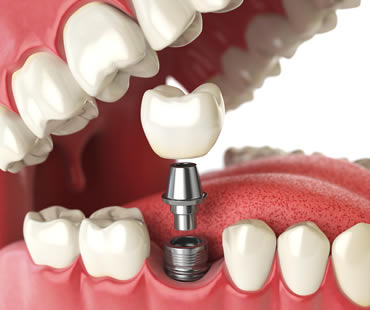
A dental implant replaces missing teeth by providing an artificial root and tooth. This type of restoration is a permanent solution that gives you back the appearance and function of your mouth. Implants match your real teeth and fuse right into your jaw bone. Implants can be used to replace a single missing tooth or an entire section of teeth.
Appearance
Dental implants vastly improve the way your smile looks. There are no more visible holes, and the restoration blends right into your smile. Your face and jaw will also have less risk of appearing sunken, as can occur when teeth are missing.
Speech
Missing teeth can cause you to slur or mumble when you speak. Dentures that don’t fit properly can also result in speech issues, so permanent and secure dental implants alleviate speech concerns.
Comfort
Once your implants become part of your jaw, you will likely not even remember you have them. They are very comfortable, and you can also maintain your normal diet. Implants allow you to avoid the problems that dentures have of slipping and discomfort.
Function
Implants act just like your regular teeth. Chewing and biting are the same as with your natural teeth, and in fact your implants will likely be even stronger than your other teeth.
Durability
With proper dental care, implants can last your whole life. Your natural teeth remain unaffected by the implants, and you can continue with your regular oral hygiene routine.
Confidence
Your self-esteem will be restored when you have your complete smile back. You will feel confident in smiling, talking, eating, laughing, and everything else you do.
Dental Implants Longview

Sometimes people lose teeth. It may result from tooth decay, trauma, disease, or other problems but no matter the cause, the end result can be poor mouth function and an embarrassing appearance. Luckily, dental implants provide an effective way to repair your smile and change your whole outlook on life.
Dental implants are basically replacement roots for your missing teeth. When you lose a tooth, you also lose the roots that hold it in place. Implants provide a substitute for the roots in order to anchor an artificial tooth securely in place. It requires oral surgery to get dental implants, because a small titanium post is placed directly into the bone where the missing tooth’s roots should be. As healing occurs over the next few months, the implanted post becomes part of your jaw and creates a very secure artificial root.
Once the implant has successfully attached to your jawbone, a small post is placed to hold your new tooth. A crown that matches your existing teeth is attached to the post, and your dental implant is complete. Some of the benefits you can expect from dental implants include:
- Permanent restoration
- Improved appearance
- Normal speech
- Comfort
- Easier eating
- Improved self-confidence
- Convenience
Before deciding to have a dental implant, make sure you see a qualified dentist or oral surgeon to make sure you are a good candidate. It is important to have enough bone to support the implant. If not, you may need some type of intervention to correct bone deficiency or you might be advised about a different type of restoration. But if you learn that implants are an option in your situation, you will be able to begin your journey to a beautiful smile.
We offer dental Implants for missing teeth at our Longview dental office

Missing teeth can put a damper on your active lifestyle. You may feel self-conscious about your appearance, experience limitations in diet, or have difficulty speaking. Without a full set of teeth, you risk gum degeneration, bone loss, and other oral health problems. Designed to mimic the look and feel of natural teeth, dental implants can rejuvenate your smile.
What is a dental implant?
A small titanium post that serves as an artificial tooth root, a dental implant is surgically positioned into your gums. Your dentist will place a permanent crown on each implant, which completes the replacement tooth. Implants can be used for one or more missing teeth.
Am I a candidate for dental implants?
In general, anyone with a missing tooth should consider dental implants. The key to successful implant placement is good oral health and sufficient bone structure to support the posts. If you don’t have adequate bone levels, your dentist may recommend a bone graft to correct that situation.
How long does the procedure take?
Receiving dental implants is a two-step process. During the first visit, a trained specialist will surgically implant the posts into your jawbone. Then, you will need to wait three to six months for healing and integration with the jawbone. Once this occurs, your dentist will place the permanent crowns on the implants, giving you a full smile.
How do I care for my implants?
Just like your natural teeth, your implants require daily care. Brush often and floss frequently. Regular dental checkups are also important, so schedule visits at least twice a year.
If you live in the Longview area contact us today

Restoring missing teeth with dental implants is the latest and greatest technique to give you your smile back. It offers many benefits such as comfort, aesthetics, security, and easy maintenance. If you are missing any teeth and would like to learn more about getting dental implants, you need to find a qualified and experienced dental professional for the job. Here are some tips on doing so.
Training
Dentists or oral surgeons who perform dental implants should have training specifically in the procedure. Look for a professional with credentials like a dentistry degree from a reputable university, participation in continuing education programs, and membership in dental organizations.
Reviews
Look online for reviews of the dentist and practice, and be sure to ask friends and family for recommendations. Word of mouth is often the best way to find a healthcare professional.
Examples of work
Ask to see before-and-after pictures of dental implants performed by the dentist. Request to see cases similar to yours.
Technology
A quality dental office should have the latest advancements in technology and equipment so that you will receive the most up-to-date care. Look for equipment like digital X-rays, chair side screens, and dental lasers. Also inquire about sedation or anesthesia methods available in the office.
Convenience
The location of the office should factor into your decision as you choose a professional to perform your dental implant procedure, as well as the office hours and staff. You should feel confident in the care you’ll receive, and feel comfortable asking questions and receiving treatment. Implant treatment requires multiple visits, so choose a dentist who you don’t mind establishing a relationship with over time.
We look forward to seeing you in our Longview dental office

Some patients wonder if dental implants are the best choice for their missing teeth. The time and effort dental implants take can be off-putting to some patients. If you’re wondering if dental implants are really worth it, there are many factors for you to consider.
Dental implant treatment takes a relatively long period of time to complete as well as to completely heal when compared to other tooth replacement options, such as a bridge. The planning process is far more involved than in other missing tooth replacement plans. The materials utilized with dental implants take more time to create in a dental lab and require greater skill and attention than other lab-created tooth replacements.
Dental implants are much stronger than other tooth replacement options, and will last years or even decades longer. When compared to a dental bridge which lasts an average of 14 years, a dental implant can last up to 30 years.
Sometimes, if insufficient bone is present to provide the necessary support for the implant, bone from elsewhere in the body might be grafted onto the existing bone. A dental implant must heal completely before any pressure is put on the new artificial tooth roots. This can take up to three months. After this time, the tooth portion of the dental implant is applied.
Dental implants are the strongest, best choice for a patient with a missing tooth. They rarely fracture and never decay. As opposed to a dental bridge that necessitates the removal of some of your natural tooth structure, a dental implant preserves adjacent teeth and allows patients the most natural, ideal choice for tooth replacement.
Dental implant candidates who are willing to be patient and plan for the future can experience the benefits these restorations have to offer. Talk to your dentist if you want to explore your options for replacing one or more missing teeth.
Our dental office is located in Longview

It’s more common that you might think for adults to lose one or more teeth due to injury or oral diseases. Missing teeth can make chewing and speaking difficult, not to mention lowering a person’s self esteem. That’s why it’s smart to ask your dentist about tooth replacement options, to see if one of them might be right for you.
Dental implants
When artificial tooth roots are inserted into your jaw to replace lost teeth, it’s called dental implants. It involves surgically placing a metal post into the bone under your gums. Then a crown is attached to the post, creating a natural-looking replacement tooth. Dental implants do not affect adjacent teeth, and they look and feel like natural teeth. They are also more secure than other tooth replacement options. However, to be considered for dental implants, you must be healthy overall, have a secure and strong jawbone, and have healthy gums.
Dental bridges
Also called a fixed partial denture, the purpose of a dental bridge is to “bridge” or close the gap between your missing tooth or teeth and your surrounding teeth. Your dentist bonds the bridge onto the teeth adjacent to your gap. This is called a fixed bridge. There are also removable bridges, which you are able to remove, clean, and replace yourself. Another type of dental bridge is called an implant bridge, which attaches to a dental implant. The various types of dental bridge are made from materials like gold, alloys, and porcelain.
Dentures
When you need a tooth replacement option for all or most of your teeth, dentures may be the best choice. Complete dentures are used when you have no teeth left, or the remaining teeth must be removed. These cover both your upper and lower gums. Overdentures are removable and may be used if you have some natural teeth remaining, or have dental implants. These are only an option if your remaining teeth or implants can provide enough support for the overdentures.
We look forward to seeing you in our Longview dental office









